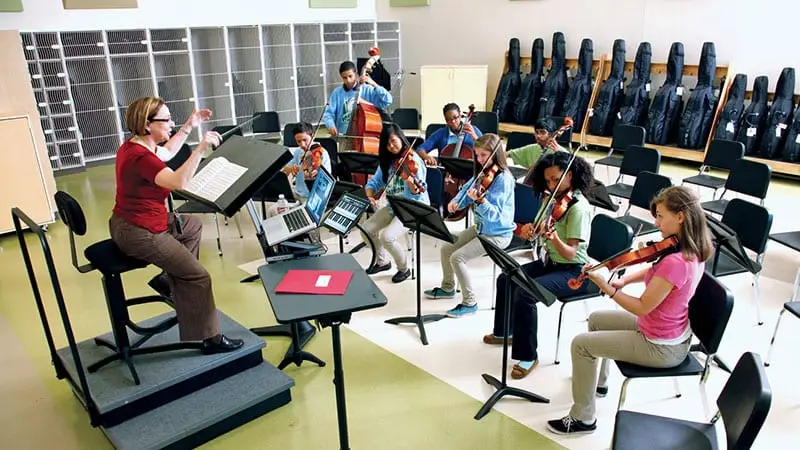Introduction to School Music Programs
School music programs encompass a broad range of activities designed to foster musical talent and appreciation among students. These programs typically include components such as choir, band, orchestra, and general music classes. Choirs allow students to develop their vocal skills and learn to harmonize in a group setting. Bands and orchestras provide opportunities for students to learn and master various instruments, while general music classes introduce fundamental concepts of music theory, history, and appreciation.
The history of music education in schools dates back to the early 19th century when it was first incorporated into the curriculum as a way to enhance students’ cultural literacy. Over the decades, school music programs have evolved significantly, adapting to changing educational philosophies and technological advancements. Today, these programs are recognized not only for their artistic value but also for their role in promoting cognitive development, emotional well-being, and social skills.
Currently, the state of school music programs varies widely across different regions. In some areas, these programs are well-funded and highly esteemed, with robust participation rates. For example, a report by the National Association for Music Education (NAfME) reveals that nearly 76% of U.S. high schools offer music programs. Conversely, in other regions, music programs face significant challenges due to budget cuts and shifting educational priorities. Statistics indicate that in schools with limited funding, participation in music programs can be as low as 30%, highlighting a disparity that impacts the accessibility of music education.
These participation rates and funding levels set the stage for a deeper discussion on the importance of school music programs and the need for continued support and investment. Understanding the fundamental components and current state of music education helps in appreciating its significance in fostering a well-rounded and enriching educational experience for students.
Cognitive and Academic Benefits
School music programs play a crucial role in fostering cognitive and academic development among students. Numerous studies have demonstrated that engaging in music education can significantly enhance brain development, improve memory, and lead to better academic performance. For instance, research published in the journal “Nature Reviews Neuroscience” highlights that music training can increase the size and connectivity of brain regions involved in memory and executive functions. This structural enhancement contributes to improved memory retention and recall abilities in students who participate in music programs.
Moreover, the relationship between music education and higher academic performance is well-documented. A comprehensive study conducted by the University of British Columbia found that students who participated in school music programs scored higher on standardized tests and exhibited increased IQ levels compared to their peers who did not engage in music education. These findings are supported by the National Association for Music Education, which reports that students involved in music programs consistently outperform non-participants in various academic subjects, including mathematics and reading.
Learning to read music and play instruments further develops critical thinking and problem-solving abilities. The process of interpreting musical notation and executing it on an instrument requires students to engage in complex cognitive tasks, such as analytical thinking, pattern recognition, and strategic planning. This cognitive engagement translates into enhanced skills that are transferable to other academic disciplines. For example, understanding the mathematical relationships in musical rhythms can bolster students’ abilities to grasp mathematical concepts, while the linguistic skills needed to interpret song lyrics can enhance language proficiency.
Expert opinions also underscore the importance of music programs in schools. Dr. Anita Collins, a renowned music educator and neuroscientist, emphasizes that music education provides a unique approach to cognitive development that is not replicated by other forms of learning. She argues that the multisensory experience of making music stimulates neural connections that are essential for overall intellectual growth. Thus, integrating music programs into school curricula is not merely an enrichment activity but a vital component of comprehensive education that supports cognitive and academic excellence.
Social and Emotional Impact
Participating in school music programs can have profound social and emotional benefits for students. Music education fosters teamwork, as students must work together harmoniously to perform as a cohesive unit. This collaborative environment necessitates effective communication skills, as members need to express their ideas clearly and listen to others’ contributions. Such interactions help cultivate a sense of social bonding and mutual respect among students.
Moreover, engaging in school music programs can significantly enhance self-esteem. Mastering an instrument or performing in front of an audience provides a sense of accomplishment and pride. This boost in confidence can translate into other areas of a student’s life, promoting a positive self-image and a greater willingness to take on new challenges.
Music education also serves as a crucial outlet for emotional expression. The act of creating and performing music allows students to channel their emotions in a constructive manner. This can be particularly beneficial for reducing anxiety and stress, offering a therapeutic escape from the pressures of academic and social life.
Testimonials from students and teachers often highlight these benefits. For instance, a high school choir director shared that many of her students found a sense of belonging and emotional support through their participation in the choir. One student remarked, “Being part of the choir has helped me make friends and feel more connected to my school. It’s a place where I can express myself without judgment.”
Similarly, a band teacher noted that students often exhibit improved emotional well-being and interpersonal skills due to their involvement in music programs. Another student commented, “Playing in the band has been a lifesaver for me. It’s helped me manage my stress and given me a way to express my feelings.”
These anecdotes underscore the importance of school music programs in fostering social and emotional development, providing students with essential life skills and emotional resilience.
Challenges and Future Directions
School music programs are currently facing a multitude of challenges that threaten their existence and efficacy. One of the most significant hurdles is budget cuts. With many educational institutions prioritizing STEM subjects, music programs often find themselves on the chopping block. This financial strain results in a lack of resources, such as quality instruments, sheet music, and experienced instructors, which are essential for maintaining a robust music education program.
The undervaluing of arts education in favor of STEM subjects further compounds these issues. Many stakeholders, including policymakers and administrators, fail to recognize the importance of school music programs in fostering creativity, emotional expression, and cultural awareness among students. This narrow focus on STEM subjects overlooks the holistic development that arts and music education can provide.
To counter these challenges, several potential solutions can be explored. Community partnerships are a viable option. Collaborating with local music organizations, businesses, and artists can provide additional resources and opportunities for students. These partnerships can also raise awareness about the value of music education and garner community support.
Fundraising efforts are another critical avenue. Schools can engage in various fundraising activities, such as concerts, bake sales, and crowdfunding campaigns to generate the necessary funds for their music programs. Additionally, leveraging grants and donations from philanthropic organizations dedicated to arts education can provide much-needed financial support.
Advocacy for policy changes is equally important. Educators, parents, and community members need to lobby for policies that recognize and support the importance of school music programs. This can involve participating in school board meetings, writing to policymakers, and using social media platforms to amplify the message.
Looking ahead, the future of music education can be bright with the integration of technology and innovative teaching methods. Digital tools, such as music production software and online learning platforms, can enhance the learning experience and make music education more accessible. Emphasizing inclusivity and diversity in music programs is also crucial. Providing opportunities for students from diverse backgrounds to engage with a variety of musical traditions can enrich the educational experience and promote cultural understanding.
In conclusion, the challenges facing school music programs are significant but not insurmountable. By fostering community partnerships, engaging in fundraising efforts, advocating for supportive policies, and embracing innovative teaching methods, we can ensure that music education remains a vital part of our schools. It is imperative that educators, parents, and policymakers unite in their support and prioritization of music education to nurture the next generation of creative and culturally aware individuals.





